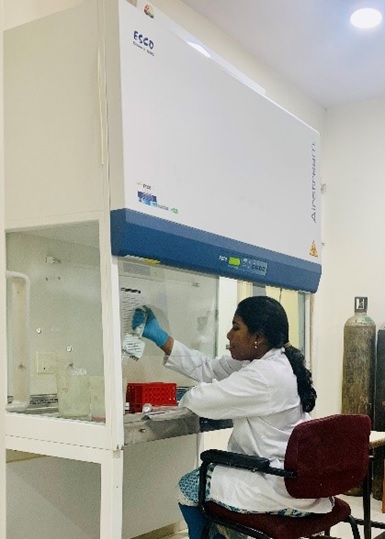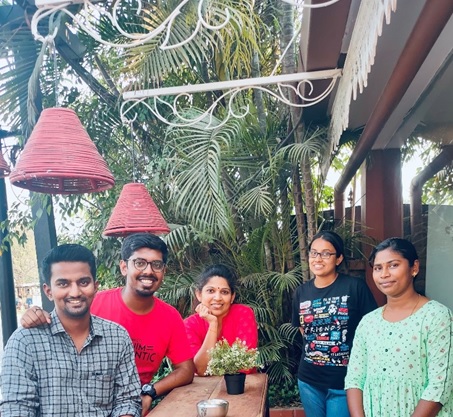Prof. P. Yogeeswari is one of the prolific Drug Discovery researchers in the field of Neuroscience and Cancer and has been in this field for more than two decades. The drug discovery research group of Prof. Yogeeswari has to their credit more than 150 research papers in international journals and about 5 patents to their credit. A start-up had evolved from this group as a spin-off and is currently one of the top women-led start-ups in the country as recognized by various awards and recognition. The startup company is currently focused on cancer detection using a non-invasive saliva-based point-of-care program which is funded by BIRAC.

Currently, Purbali Chakraborty and Deepika K from my drug discovery research lab are working towards designing new drugs against cancer targets and neuropathic pain specifically migraine, synthesis of candidate drugs, screening of the drugs and preclinical studies for understanding their pharmacological activities in animal models.
Previous research from my lab has accomplished drug design and synthesis for various new targets of complex neurological diseases like Autism, Alzheimers, Epilepsy, Fragile X syndrome, and neuropathic pain. They have patented many novel compounds with anti-cancer and anti-inflammatory effects. Neuropathic pain refers to pain arising due to damage of nerves in the central or peripheral nervous system. It results from a huge range of health conditions such as diabetic neuropathy, chemotherapy, radiotherapy, trigeminal neuralgia, complex regional pain syndrome, and AIDS-related neuropathy. The abnormal pain phenomena like allodynia (touch-evoked pain) and hyperalgesia (pain resulting from non-noxious stimuli) will be severely debilitating. Due to the non-availability of effective and well-tolerated neuropathic pain therapies, research into the discovery of novel compounds for neuropathic pain treatment is the need of the hour.

Cancer drug discovery in our research group has yielded success in breast cancer therapeutics which was effective against all three types of breast cancer that includes the triple-negative type for which there are no drugs in the market. The research group is currently focussing on oral cancer therapeutics in collaboration with the Biological Sciences department with Dr. Trinath in the discovery of drugs targeting glucose metabolism in cancer. We work on designing new drugs/ prototypical leads to target specific cancer proteins, using computational tools based on several algorithms to screen and design thousands of compounds in a short time. This strategy is followed by the selection of a few best chemical structures (pharmacophores) which show high affinity towards the target cancer protein. Multiple chemical compounds (new chemical entities or NCEs) are synthesized in our lab based on the selected pharmacophores. These NCEs are then tested in the biological systems, specifically the enzymes/ proteins or cancer cells in petri dishes followed by testing the most effective NCEs in animal models of cancer. Mechanistic studies are also performed to understand the mechanism of action of the NCEs in in-vitro culture systems (in the cancer cells), the techniques include western blot (for protein expression), real-time PCR (for gene expression), immunofluorescence studies (using confocal microscopy). The actives NCEs are also studied for their efficacy in 3D spheroid models of tumor in vitro to study cancer cell spheroid growth inhibition.
You Might Also Like
- BITS to Baker Hughes: Shad Hussain’s Journey Through Turbulent Times
- Be Cool: Navigating Life, Literature, and Mental Health with Shashi Warrier
- Coaching Across Cultures: Brajesh Bajpai’s Journey of Learning, Leading, and Adapting
- From Engineer to AI Leader: An Interview with Akhil Singhal on Startups, Strategy, and the Future of Gen A
- From Circuits to Capital Markets: Deepak Joshi’s Global Finance Journey














